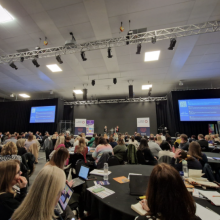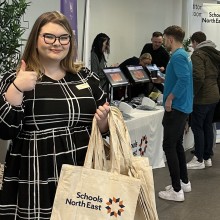Yesterday marked our fifth annual Curriculum Conference… and 2024 certainly proved to be one for the books!
Gathering our region’s remarkable school leaders, teaching practitioners, and learning leads under one roof is always a cause for celebration, and it was truly inspiring to see everyone come together to learn, connect, and grow.
United by a shared commitment to shaping the future of learning, the positive energy across the Glow Venue was unmistakable; before we fondly look back, we want to thank everyone for taking the time out of their hectic schedules to join us!
Now let’s run through the day’s events.
A busy morning bursting at the seams with insight and inspiration
The event kicked off at 08:40 sharp with messages from Chris Zarraga (Director of Schools North East), Colin Lofthouse (Chair of Schools North East), and Sarah Price (CEO of event sponsors Go Well).
Chris first addressed the crowd with a welcome message:
“Today is about you connecting with your colleagues to develop each other’s knowledge of curriculum. North East schools and all of their staff do a tremendous job of supporting young people, their families and communities in some of the most deprived and most difficult circumstances in the country.
“Far too often you and your colleagues rarely get the recognition for your extraordinary contribution to our country and its young people.”
Once all 200 guests had been greeted and briefed on the day’s agenda, the exciting professional development and collaborative learning could begin!
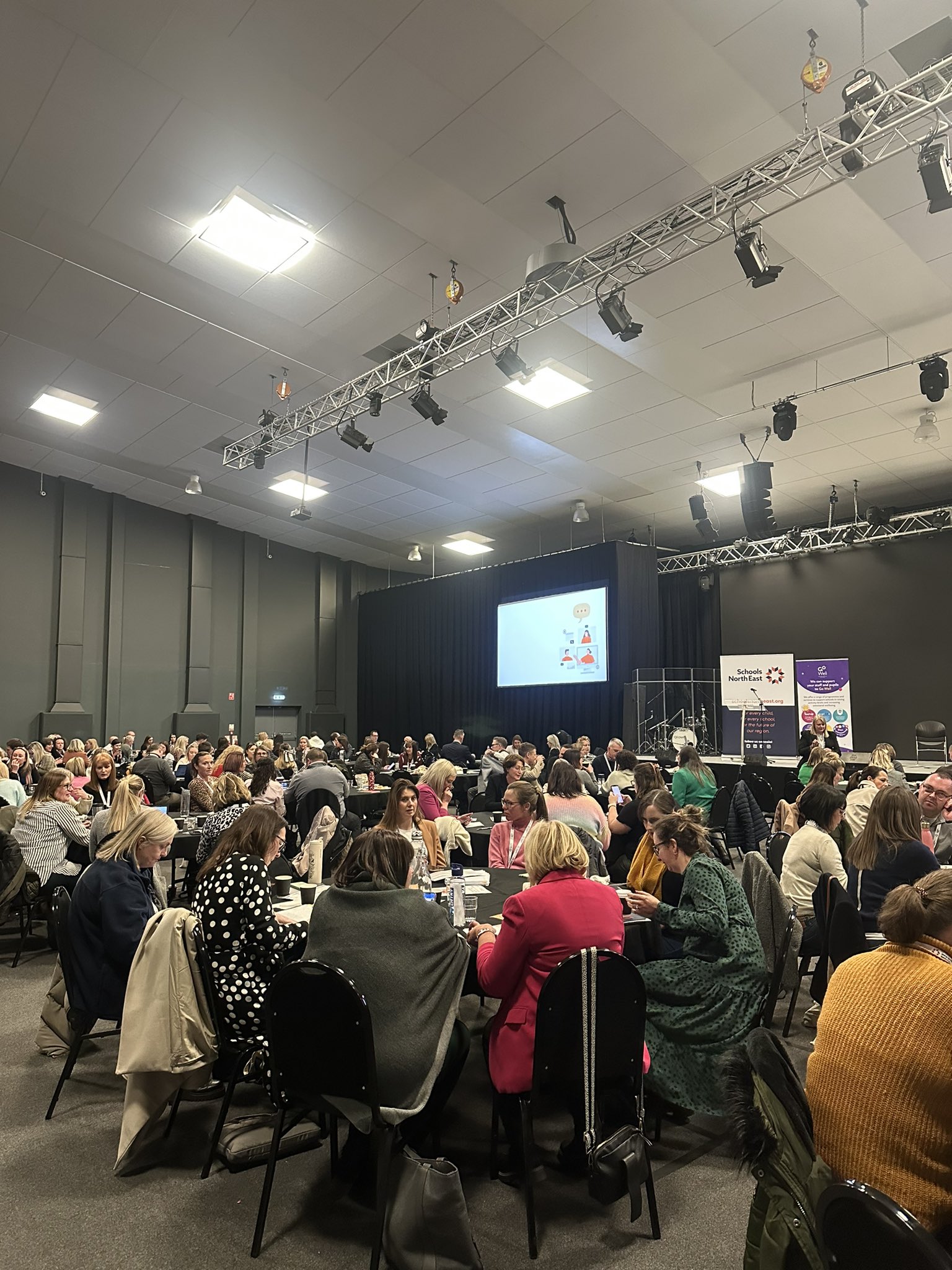
Auditorium one, part one
At 09:00 Debi Bailey (CEO of NEAT Academy Trust) and Sarah Stock (Director of Newcastle Research School) joined us on the main stage to deliver a session on NEAT Academic Trust: Ongoing Curriculum Development.
It’s never a bad idea to start off a presentation with pictures of cute animals (are you the koala bear or the squirrel this term?), and once that ‘check in’ was done, Debi and Sarah then shared their ongoing curriculum development journey, reflecting on principles of curriculum design.
The session explored the different purposes and intents of a curriculum, with Sarah asking: “what is the purpose of your curriculum?” allowing the audience to spend a minute reflecting on the question and discussing amongst themselves.
It was a hugely insightful presentation that covered learning progression, mapped career opportunities, curriculum design, and the five characteristics of an effective learner. A cracking way to start the day!
Following on from Debi and Sarah was Peter Sagar, Teacher and Secretary of A Living Tradition CIC, who spent 30 minutes exploring how we can use the national curriculum to help our pupils.
Opinions on the national curriculum are varied and complex, not just across North East schools, but throughout the country. So, it was interesting to discuss how – and why – we should put a regional focus on the curriculum to help raise pupil’s aspirations and build strong communities.
Reviving our culture, giving pupils a sense of identity and place, and providing a bridge into other cultures, were just three reasons why Peter insisted school leaders should consider adapting the curriculum to highlight Northern traits and roots.
Peter spoke with confidence and passion, and did well to remind us of all the different ways the North East has been instrumental in much of our country’s success, both historically and in the present day. So why, he asks, are we not teaching our region’s young people all about this?
Some excellent points were made.
Session round one
After a 30 minute break where delegates had the opportunity to network, meet with exhibitors, and replenish with tea and coffee, we moved into the breakout rooms to absorb more knowledge on the topic of curriculum.
In auditorium one, Marie Graham and Clare Sutherland (Executive Head Teacher and Head of School respectively at Bishop Chadwick Catholic Education Trust) began exploring ‘Curriculum Continuity: Learning as a Journey not a Destination’. An interesting session full of guidance that delegates could apply at both KS1 and KS2.
Over in auditorium two, Dominic Martin and Karl McGrath (Head Teacher and Curriculum Design Lead at Benton Park Primary School) delivered an interesting session tailored to KS1 school colleagues. In ‘Disciplinary Thinking and Task Design in Primary Education’, we delved into cultivating disciplinary knowledge within the curriculum.
And in conference room one, we explored ‘Developing Truly Ambitious Curriculums’ with Paul Wright, Teacher of Computer Science at Ponteland High School. Here we learned more about exactly what ambition looks like, and how we can use research, reviews, and voices to amplify this ambition.
Mary Myatt – A Great Curriculum for All
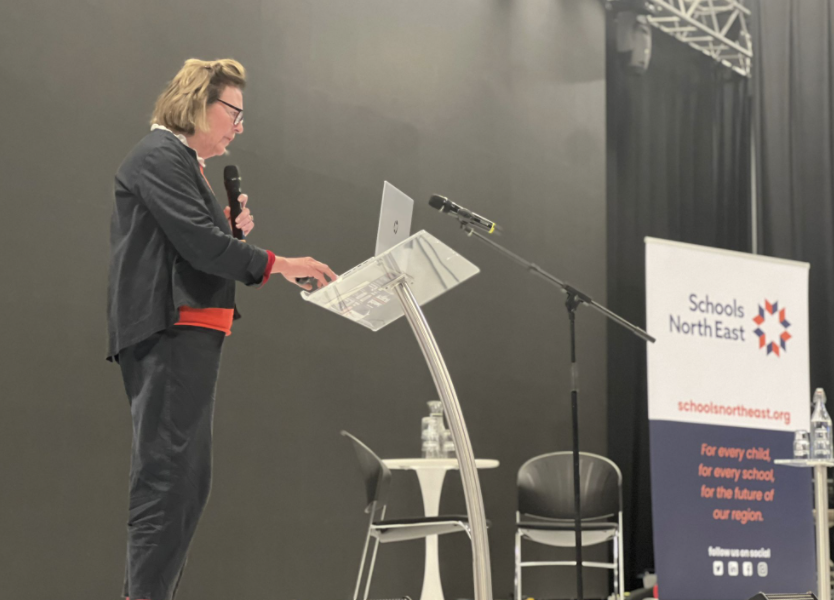
At 11:30, we were thrilled to be joined by Mary Myatt, well-known Education Adviser, Writer, and Speaker.
It was a real privilege to hear her speak for 75 minutes, helping us better comprehend what it takes to create a great curriculum for every child. Mary was generous with sharing light touch ways to enrich, enliven, and deepen the curriculum.
Throughout the session, she provided various quotes and real-world examples to highlight the importance of developing a curriculum that has the right priorities.
Within her speech, she also touched upon how the sector needs to look beyond teaching children the definition of a word, and instead dig deeper into the why, so that they have a better chance of connecting subjects in future learning.
One of her examples included the word ‘isosceles’ and how we tend to teach that it’s a triangle, instead of delving deeper and explaining that the word is formed by two Latin words: isos, which means equal, and skelos, which means legs.
At 12:45, we then moved into an interactive Q&A session so that the audience could fully engage with Mary Myatt, and tap further into that brilliant brain! Hosted by Alex Fairlamb (Assistant Principal of Kings Priory School) Mary began to answer questions in depth.
One delegate asked: “What is the most efficient way primary teachers can become subject experts outside of core subjects?”
Mary used this opportunity to talk about the strength in using high quality text.
Another participant asked Mary to tell us more about the use of ‘knowledge organisers’, and Mary responded by explaining that they’re powerful because they capture the key concepts that are the gateways to the topics we’re teaching.
“They’re an opportunity for children to dig deep,” Mary confirmed.
Panel: Great Curricula for Great Schools chaired by Colin Lofthouse
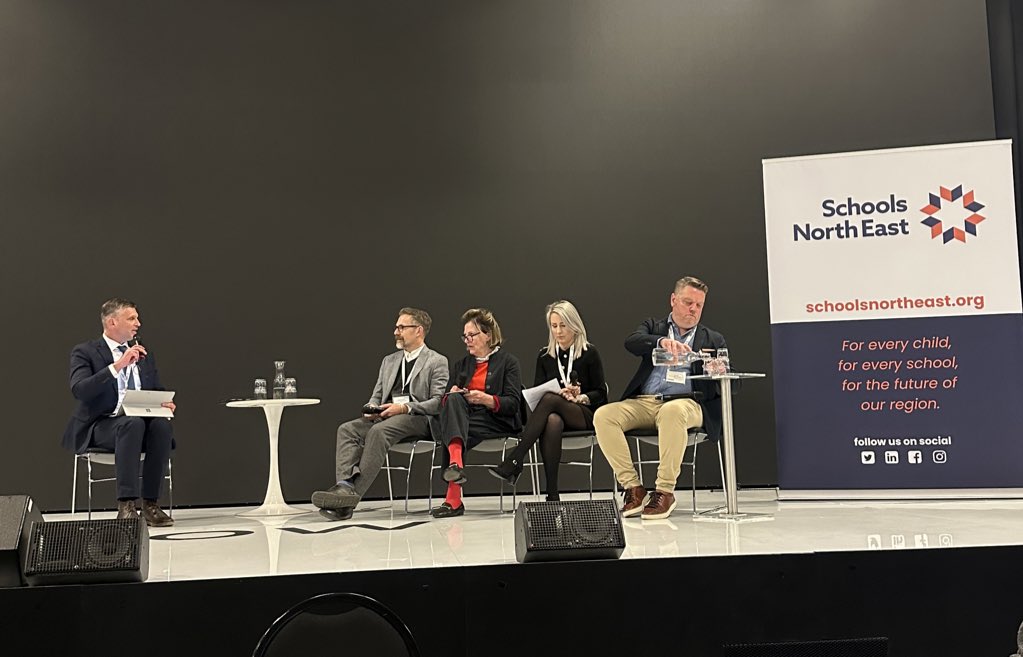
After a well-spent lunch break that saw delegates refuel, play exhibitor bingo (how many numbers did you get stamped?!) and strengthen connections within the community, we moved back to the main room for the highly-anticipated panel discussion.
Colin Lofthouse was joined by Mary Myatt, Alex Fairlamb, Dominic McGrath, and Jon Tait (Director of Education at Northern Lights Learning Trust) to talk about how we can create great curricula within great schools.
We encouraged the audience to get involved via Slido, and they submitted questions such as:
“How do we enrich the curriculum/evoke curiosity when exams are the main priority?”
“What specific government policies do you feel have had the most noticeable impact (good or bad) on student learning and outcomes?”
One question in particular had delegates nodding their heads passionately: ‘If the curriculum has to be local, regional, diverse, evidence-based, aspirational, inclusive, exciting, authentic etc etc it’s too much. Where to begin?”
Mary assured the audience that the sector does have sufficient time to do it all justice, and that we must be brutal about what it is that pupils need. Mary said it’s about refining our process as well as refining the curriculum.
The panel discussion was thought-provoking, to say the least, and provided delegates with a dynamic exchange on a few topics that are incredibly relevant right now. The diverse perspectives offered a refreshing mix of insights and practical strategies that our school colleagues can (hopefully!) take away and implement within their own schools.
Session round two
With inspiration running high, delegates then moved back into their individual breakout rooms for session round two at 14:45.
In auditorium one, delegates gained further insight into ‘The Curriculum in Early Years: Focus on Communication and Language’ presented by Kirsty Godfrey, HMI, Ofsted. Ideal for school leaders, teaching practitioners, and learning leads across KS1, we were treated to various insights relating to things such as curriculum principles, and early reading and writing.
Auditorium two was an interactive workshop with Lorna Mclean (Principal of King Edwin School) examining the impact of the wider curriculum on students, including outdoor learning, out of hours learning, and holiday experiences. We bet delegates weren’t expecting to play Monopoly today…
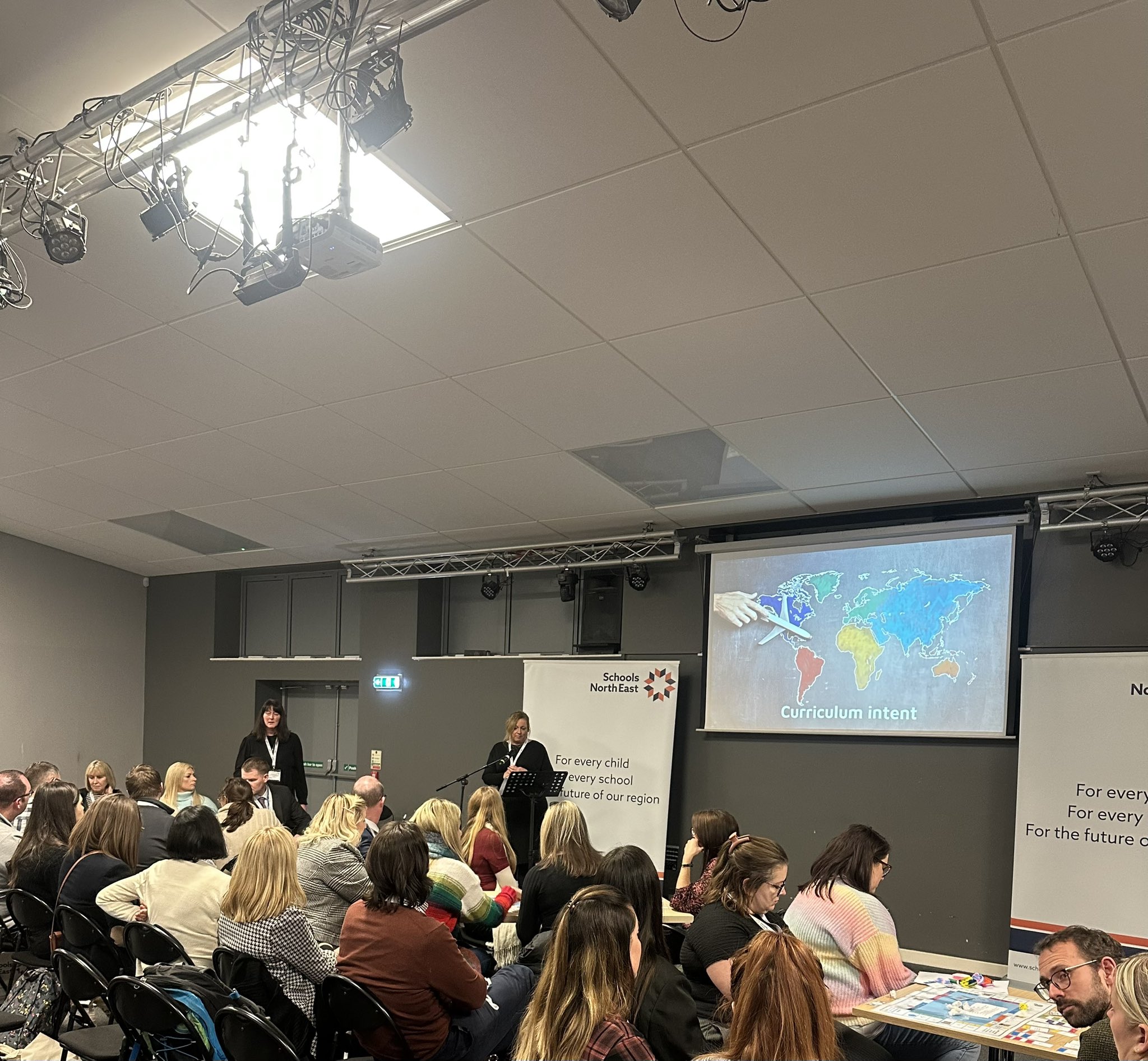
And in conference room one, a session tailored specifically for secondary school colleagues was taking place, with Giles Fullard and Joe Milton (Head of Humanities Faculty and Deputy Faculty Leader respectively at Whickham School) sharing real-world examples of how re-planning the curriculum helped change culture and outcomes in history and geography.
Session round three
The day was drawing to a close, but not before delegates moved through to session round three for one more burst of knowledge!
Back in auditorium one, we explored how to develop a reading culture by looking at the strategies Kibblesworth Academy put in place to shift attitudes and increase engagement.. Huge thank you to Craig Steel (Head Teacher) and Sarah Renton (Deputy Head) for this knowledge and guidance.
In auditorium two, we were joined by Claire Wood and Tracey Dodds (Assistant Head Teacher and Alternative Education Coordinator, High Tunstall College of Science). Claire and Tracey took us on the journey of how they developed five distinct provisions at the College, sharing challenges and triumphs along the way.
And to finish, in conference room one, we experienced an in-depth discussion that explored ‘Re-energising Language Learning in State- Funded Primary and Secondary Schools’ with Jane Wood, Languages Department Lead at Cardinal Hume Catholic School, and Caroline Conlon, Director of School Partnerships and Professional Development for the NCLE.
A successful day that we won’t be in a hurry to forget
Looking back, we see rooms filled with engaged faces, lively discussions buzzing with innovative ideas and fresh perspectives, and a determined spirit fuelled by the shared passion for shaping young minds and strengthening North East schools.
The delegates’ open minds, active participation, and enthusiasm were the fuel that powered this event, making it another success. Huge, huge thank you to everyone who attended and contributed to making this another unforgettable year – delegates, exhibitors, sponsors, and speakers alike!
Here’s to Curriculum Conference 2025…
(Too soon?)
***

If you attended the event, we’d love to hear your thoughts! Submitting your feedback helps us continue improving our events year on year. Oh, and you might even win a bottle of champagne… Submit your feedback here.

